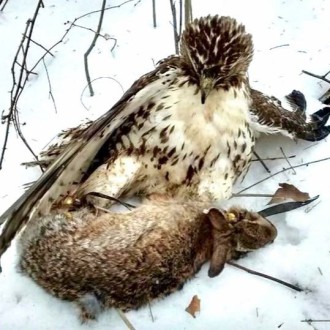Eric Hausman’s passion for raptors began on golf courses, where he worked for many years. “The only time I’d stop was for golfers to pass through, or to watch birds of prey,” the Weaverville resident remembers.
Now a certified falconer, Hausman helps the Carolina Raptor Center in Huntersville rehabilitate injured birds from time to time. “They call and ask me to train and access the bird and evaluate its condition,” he explains. “It’s another huge commitment, but it makes me feel good helping the wildlife and especially the bird-of-prey population. By the time I release a bird, I have no worries about its survival.”
One of the oldest known forms of hunting and sport, falconry remains shrouded in mystery and misunderstanding, often seen as an arcane and sometimes brutal practice.
Inspired by his older brother’s interest in the sport, Hausman decided to pursue his dream of getting certified after moving to Western North Carolina. “This was the first place I’ve lived where I had the land and room to actually keep a bird,” he explains.

Becoming a falconer is a long, complex process, guided by extensive state and federal regulations. “You have to do a two-year apprenticeship” with a certified falconer, says Hausman. “You’ve got to take a state exam in Raleigh, and you’ve got to have your facilities inspected by a Fish and Wildlife Service biologist.” Hausman gained certification eight years ago.
Learning the intricacies of proper care and training of a raptor is not for the dilettante, he emphasizes. “It’s like having a kid: Every single day, I’ve got to do something for the birds.” To persuade a falconer to sponsor the apprenticeship, beginners must display a real devotion to learning the trade. “If you’re not willing to come hunt every chance you get,” he notes, “you’re not up for the responsibility of keeping a bird of prey.”
That includes knowing which birds can be trapped (federal regulations allow only juvenile birds to be taken into captivity) and an extensive period of developing trust with one’s bird. “In general, it takes 30-40 days to go from wild-trapped to free-flying a normal red-tailed hawk,” says Hausman. “It takes an extreme amount of patience, and every bird is different.”
Know your raptor
Some birds are better suited to than others to WNC’s terrain. “For where I live, red-tailed hawks are the best bird.” Flying others, such as peregrine falcons, is “asking for trouble” he maintains, because these wide-ranging hunters may dart off over the next ridgeline in search of prey, leaving the falconer far behind, and blocking the electronic tracking devices falconers use to catch up with their birds.
Prey ranges from rodents and small mammals to crows and even ducks, depending on the type of raptor.
Combating public misconceptions is another major challenge. In the wild, about 80 percent of juvenile raptors die in their first year, says Hausman. Parasites, injuries and human-related hazards all pose significant risks.

“My bird right now has no clue how to catch a squirrel; when I caught her, she was 41 ounces, which is less than a week from death,” he reveals. “The bird I trapped last year was injured from electrical shock; it took six months of rehabbing to heal her up.”
Some falconers keep a bird for life, but Hausman says they gradually become more dependent on humans. He prefers to release them after a year or two, to ensure that they can successfully return to the wild.
Eye-opening
Despite the time and energy involved, Hausman says the experience of the hunt and the relationships he develops with his birds make it worth every second. “I’m not necessarily a big hunter, but the bond that develops in the hunting experiences you have with a wild animal is priceless.”
Raptors’ “intelligence and simplicity of life,” he says, are amazing. And the unpredictability and adventure of hunting with the birds has taught him a lot about life’s sometimes harsh realities. “Anything can happen, and every day you come home with your bird is a good day,” he notes. “It’s a very eye-opening sport: It’s taught me a lot about life and death in the wild.”
Hausman’s also happy to share what he loves with whoever is interested. “I highly recommend it to anyone that has the time and passion for birds,” he says. “If you have land for my birds to fly, I’d love to take you all out to enjoy the experience.”
Donations and tips are accepted, but “Any gratuities benefit the Carolina Raptor Center.”
More than anything, Hausman wants to expose others to the beauty and power of the creatures that continue to captivate him. “It’s changed my life for the better,” he says. “I always wanted a family and kids; this is the second-best thing.”



Before you comment
The comments section is here to provide a platform for civil dialogue on the issues we face together as a local community. Xpress is committed to offering this platform for all voices, but when the tone of the discussion gets nasty or strays off topic, we believe many people choose not to participate. Xpress editors are determined to moderate comments to ensure a constructive interchange is maintained. All comments judged not to be in keeping with the spirit of civil discourse will be removed and repeat violators will be banned. See here for our terms of service. Thank you for being part of this effort to promote respectful discussion.